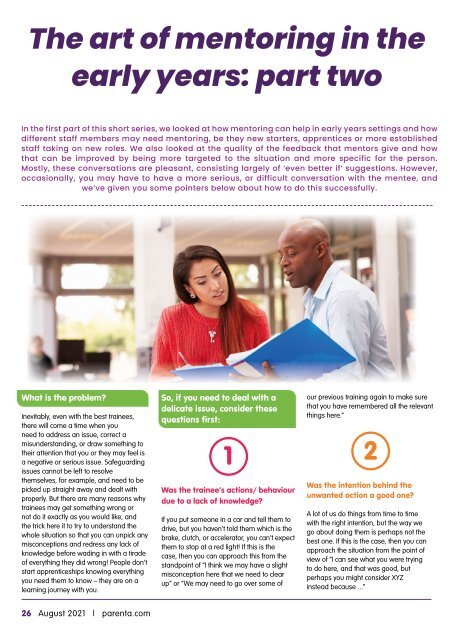August 2021 Parenta magazine
- No tags were found...
Create successful ePaper yourself
Turn your PDF publications into a flip-book with our unique Google optimized e-Paper software.
The art of mentoring in the<br />
early years: part two<br />
In the first part of this short series, we looked at how mentoring can help in early years settings and how<br />
different staff members may need mentoring, be they new starters, apprentices or more established<br />
staff taking on new roles. We also looked at the quality of the feedback that mentors give and how<br />
that can be improved by being more targeted to the situation and more specific for the person.<br />
Mostly, these conversations are pleasant, consisting largely of ‘even better if’ suggestions. However,<br />
occasionally, you may have to have a more serious, or difficult conversation with the mentee, and<br />
we’ve given you some pointers below about how to do this successfully.<br />
3<br />
Do they just need more practice to<br />
master the skill?<br />
If this is the case, then remember that<br />
everyone is different and learns in different<br />
ways and at different rates. Remember to<br />
praise their effort rather than focus solely<br />
on the outcome and tell them what they do<br />
well first, not just that they put the nappy on<br />
the wrong way round. Did they do a good<br />
job of building rapport with the child first,<br />
putting them at ease? Did they clean the<br />
child well and follow your procedures for<br />
nappy disposals etc? If they did, then you<br />
can praise that, then ask them to practice<br />
what they need to do better – perhaps on<br />
a doll so that they feel more confident.<br />
Each of these approaches recognises<br />
that there is something missing from the<br />
trainee’s knowledge or skills, but all are<br />
couched in terms that also offer a solution,<br />
and a solution that you can work through<br />
together. It will not feel like you are pointing<br />
the finger of blame at them, which can<br />
cause a lot of distrust, ill will and ultimately,<br />
a breakdown of the relationship.<br />
a better job and to work together to find a<br />
solution. Even if you feel that the solution<br />
is that the person would be better suited<br />
to working in a different job entirely, your<br />
approach should be that you are helping<br />
them, in a similar way that you would help<br />
a child to manage their poor behaviour<br />
from a place of compassion, not revenge.<br />
3<br />
Take time to understand the facts in the<br />
full situation and collect information from<br />
colleagues if you need to.<br />
4<br />
Listen to all sides of the story and really<br />
seek to understand what went wrong<br />
without jumping to conclusions and<br />
looking at your own actions too – were<br />
there policies that were missed, not fit for<br />
purpose, or was your training inadequate<br />
in some way?<br />
6<br />
Depending on the situation, you may want/<br />
need to have another neutral observer<br />
in the room as a witness to what is said<br />
and/or to record the details for your<br />
records. In certain circumstances, the other<br />
person may request or have a right to<br />
this too, such as having a union or legal<br />
representative with them.<br />
7<br />
Make sure you follow your own policies<br />
and procedures for any disciplinary action<br />
you need to take, which means you should<br />
already have robust and appropriate<br />
policies in place for dealing with staff,<br />
complaints, or disciplinary procedures in<br />
advance.<br />
Hopefully, mentoring will be a positive and<br />
productive working relationship for early<br />
years settings that benefit everyone, and<br />
with good training, effective mentoring,<br />
and support, difficult situations will be rare.<br />
What is the problem?<br />
Inevitably, even with the best trainees,<br />
there will come a time when you<br />
need to address an issue, correct a<br />
misunderstanding, or draw something to<br />
their attention that you or they may feel is<br />
a negative or serious issue. Safeguarding<br />
issues cannot be left to resolve<br />
themselves, for example, and need to be<br />
picked up straight away and dealt with<br />
properly. But there are many reasons why<br />
trainees may get something wrong or<br />
not do it exactly as you would like, and<br />
the trick here it to try to understand the<br />
whole situation so that you can unpick any<br />
misconceptions and redress any lack of<br />
knowledge before wading in with a tirade<br />
of everything they did wrong! People don’t<br />
start apprenticeships knowing everything<br />
you need them to know – they are on a<br />
learning journey with you.<br />
So, if you need to deal with a<br />
delicate issue, consider these<br />
questions first:<br />
1<br />
Was the trainee’s actions/ behaviour<br />
due to a lack of knowledge?<br />
If you put someone in a car and tell them to<br />
drive, but you haven’t told them which is the<br />
brake, clutch, or accelerator, you can’t expect<br />
them to stop at a red light! If this is the<br />
case, then you can approach this from the<br />
standpoint of “I think we may have a slight<br />
misconception here that we need to clear<br />
up” or “We may need to go over some of<br />
our previous training again to make sure<br />
that you have remembered all the relevant<br />
things here.”<br />
2<br />
Was the intention behind the<br />
unwanted action a good one?<br />
A lot of us do things from time to time<br />
with the right intention, but the way we<br />
go about doing them is perhaps not the<br />
best one. If this is the case, then you can<br />
approach the situation from the point of<br />
view of “I can see what you were trying<br />
to do here, and that was good, but<br />
perhaps you might consider XYZ<br />
instead because ...”<br />
How to handle serious<br />
misconduct<br />
If there has been a serious breach and the<br />
apprenticeship or the person’s employment<br />
is in jeopardy, then you should still use the<br />
above criteria, but think also about the<br />
following:<br />
1<br />
Do you need to include other people in the<br />
discussion, such as a line manager, setting<br />
owner, or Designated Safeguarding Lead?<br />
Make sure you are prepared to answer<br />
questions about your own role as mentor,<br />
as well as that of your mentee.<br />
2<br />
Remember the reason you need to have<br />
the conversation is to help the person do<br />
5<br />
Keep your composure and remain<br />
professional, using a calm tone of voice<br />
and choosing your words carefully. Avoid<br />
emotive language and talk about the<br />
behaviour rather than attacking them as<br />
a person.<br />
Mentoring is always about helping<br />
someone get from where they are<br />
currently, to where they want to be,<br />
whether that is about their skills,<br />
experience, or knowledge, and good<br />
mentoring will undoubtedly play a large<br />
part in determining the successful outcome<br />
for the mentee.<br />
26 <strong>August</strong> <strong>2021</strong> | parenta.com<br />
parenta.com | <strong>August</strong> <strong>2021</strong> 27

















